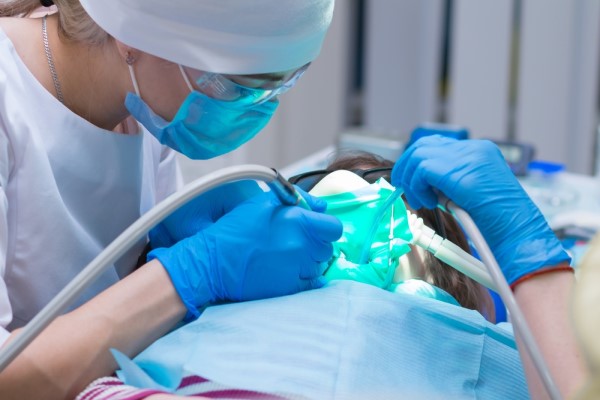Oral Sedation for Kids Before the Dental Visit

A pediatric dentist may sedate children for more in-depth procedures in the form of oral medication, via a facial mask, or intravenously. Generally, sedatives administered via a facial mask can be used for any procedure or appointment because they are so mild. However, the other two forms of sedation for kids are for more specific procedures or appointments. Having an understanding of each sedative and when it is recommended can be quite helpful to curious parents. Keep reading to learn more.
A quick guide to oral sedation for kids in pediatric dentistry
Below is a quick guide to oral sedation and other sedatives that pediatric dentists use for kids. Reviewing this information can be helpful for both parents and their children.
Oral sedation for kids
One way that pediatric dentists administer sedation to kids is via oral medications. The treatment helps with restorative procedures or more intensive procedures than a regular check-up or cleaning. Oral sedation for kids intends to induce unconsciousness, which allows the patient to be completely unaware of what is happening during the procedure. Oral sedation eliminates any potential of feeling discomfort or experiencing nervousness, fear, or anxiety.
In rare scenarios, oral sedation may not put the patient completely out. If this is the case, the goal is still for it to induce feelings of calmness. Occasionally, children may require additional sedatives to complete the procedure. Read on to learn about other sedatives used in pediatric dentistry.
Other sedatives
For kids, laughing gas is the most common method of sedation. Laughing gas, medically known as nitrous oxide, is administered through a tube connected to a facial mask. The tube connects to a tank of nitrous oxide, which helps induce calmness without making the patient unconscious. Laughing gas is administered for about 15 to 20 minutes or until the patient begins to relax. Depending on the amount induced, the effects can last up to an hour or two.
In serious dental cases, the pediatric dentist might require the patient to be administered a sedative intravenously. During oral surgery, the patient might need to be completely unconscious with no possibility of waking up during the procedure, which is where intravenous sedation comes into play. The sedative is fed through the patient's veins throughout the process, thus ensuring complete unconsciousness.
The role of a pediatric dentist
Pediatric dentists are general dentistry specialists that further their education and career by learning how to work with patients that are under the age of 18. Of course, general dental care is similar for patients of all ages. However, when it comes to pediatric patients or those under the age of 18, there may be additional efforts that go into patient care. For example, children tend to require more patience when it comes to performing a check-up or cleaning. The extra time may be to keep children calm, distract them from the procedure, or inform them about the necessary work to improve their oral health. Additionally, when needing a restorative procedure such as a root canal or dental crown placement, there might be added fear or anxiety, thus requiring sedation.
Pediatric dentists undergo extensive training to learn how to properly care for children, thus allowing for a positive experience at a young age. The better a child's dental experience is at a young age, the more likely they are to continue caring for their oral health throughout adulthood and have a positive view of visiting the dentist.
What else to know
When it comes to sedation for kids, it is important to know that pediatric dentists will only advise it when it is absolutely necessary. It can be a great tool for children who suffer from anxiety, fear, or nervousness when it comes to visiting the dentist.
Additionally, sedation for kids can have lingering effects. Nitrous oxide, as stated earlier, is the mildest form and does not last long. Oral sedatives and intravenous ones, on the other hand, can have effects that last for hours, thus requiring the help of a parent or guardian afterward.
Find out more today
Parents that want to know more about sedation for kids can consult directly with a pediatric dentist. During the consultation, the parents and children are able to ask questions or go over any concerns that may be outstanding and help alleviate fear about the procedure. Additionally, the pediatric dentist can go over each sedative in depth, which can help ease any anxieties or fears. We recommend reaching out today to learn more or get scheduled for an appointment.
Request an appointment here: https://www.orthodonticprecision.com or call Precision Orthodontics & Pediatric Dentistry at (703) 391-8800 for an appointment in our Reston office.
Check out what others are saying about our dental services on Yelp: Pediatric Dentist in Reston, VA.
Recent Posts
A pediatric dentist is a dental specialist that helps ensure that children are able to keep their baby teeth healthy to avoid any future issues with their permanent teeth. This guide provides information on why baby teeth are important and how to care for them through good oral health.Healthy baby teeth help ensure the proper…
Our pediatric dentist says good oral hygiene for babies starts even before their first tooth erupts. Tooth decay is the most common dental issue that affects children, and acids created by oral bacteria cause it.A child’s first tooth should erupt by the time they are six months old, and it is typically an upper incisor.…
Dental exams from the pediatric dentist are necessary to keep your child's dental health on track. The primary (baby) teeth of your child prepare the way for their permanent teeth. According to the American Dental Association and the American Academy of Pediatric Dentistry, a child should see a dentist when their first teeth emerge or…
Understanding the dental issues your pediatric dentist can treat will give you peace of mind. Children tend to be prone to falls and bumps. They are fond of sweets, and their teeth are still developing. Catching and treating pediatric dental issues early is important for your child’s dental health. If you want to know the…


